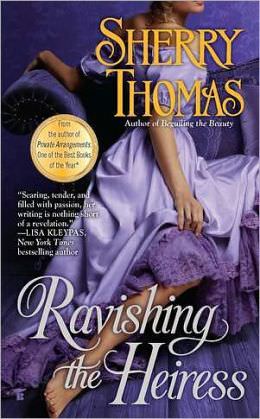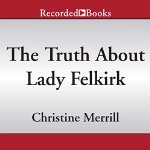Ravishing the Heiress is the second book in the Fitzhugh trilogy and tells the story of the young Earl Fitzhugh, known to his friends as Fitz, and his wife, Millie, who are contracted into an arranged marriage at the ages of nineteen and sixteen respectively.
I read the print version when it came out last year and loved it, but it has certainly divided opinion. For one thing, it involves adultery, which is a complete no-no for some people in a romance novel, and also, for most of the book, Fitz is pining for another woman, completely clueless and sometimes thoughtless in his actions towards Millie, the wife he didn’t want and initially utterly resents.
I can certainly see and accept those criticisms, but in my opinion, the story is so well-crafted that those things – while painful to read and listen to – haven’t spoiled my enjoyment of the book, which is actually rather a beautiful love story.
Millie Graves is the only daughter one Mr. Graves, who has made his fortune in the manufacture and sale of canned goods. His dream is to have a titled grandchild and so he finds an impoverished earl for Millie to marry. Unfortunately, that Earl Fitzhugh dies, but undeterred, Mr. Graves betroths Millie to the new, nineteen-year-old earl. He is in desperate need of her money, but he is also desperately in love with the beautiful Isabella, a young woman he has known for years.
Fitz is young, gorgeous, and athletic, and Millie falls for him on sight. She knows he is marrying her for money, but hopes that perhaps they can make something of their marriage after such an inauspicious beginning. Those hopes are soon dashed however, when she – unbeknownst to him – sees Fitz and Isabella together and sees how much in love they are, and she decides, then and there, that she is going to do the only thing she can, which is to attempt to protect herself from hurt and show no emotion whatsoever. She also proposes to Fitz that they live separate lives until a future time, a suggestion to which he readily agrees.
The book is written partly in flashback, a device, which I really enjoyed. We see Fitz and Millie “today” (in 1896) and then go back every other chapter to various occasions in 1888-90 – such as when they met, their wedding day, their honeymoon and other vignettes of their life together over the years.
The earliest of these occasions, which deals with Fitz and Millie’s wedding and honeymoon, are excruciatingly painful to read and possibly even more so to listen to. Jenny Sterlin’s narration is well-paced and well-thought-out; she’s a narrator who makes good use of silence and I thought she did an excellent job of conveying what Mille was going through underneath her calm exterior and considered words. She adopts a tone for the young Fitz, which really brings out his teenaged petulance, especially in the scenes immediately after the wedding.
Millie is stoical throughout, but her heartbreak is palpable. I thought it was even more so in audio as there is so much she doesn’t say which is brought out in the performance. It’s she who pulls Fitz out of his slump, and when she does, gives him to believe that she, too, has been disappointed in love.
As the story of their life together progresses, Fitz and Millie forge a firm collaboration and friendship. Even though Millie is well aware that he sleeps with other women, she is not bitter – in fact there’s rather a lovely scene in which she talks about his modus operandi when it comes to choosing a mistress! I can completely understand why some readers find this aspect of the story unpalatable. For me, though, it makes sense. If Ms. Thomas had written a story in which a very attractive young man stayed celibate for eight years while being married in name only to a woman who had actually given him permission to do as he liked (and told him she didn’t want to sleep with him for the next eight years!), she would have been accused of writing something unrealistic. And in my mind, the fact they are married is irrelevant at this point – they don’t have a marriage in the true sense and haven’t made any emotional commitments (although of course, Millie has – Fitz just doesn’t know it.). That might not a good enough reason for some – but it works for me.
What we hear developing is a truly beautiful and mutually supportive relationship. Fitz still manages to be stupid on occasion – such as the scene where his current lover gives Millie a dirty look at a ball, and Fitz basically says “nobody mistreats my wife and gets away with it.” Well, other than Fitz, of course. But for the most part, they are each other’s best friend and over the years they build a life together in the same way as any other married couple. They make joint decisions about their house and the business left to Millie by her father, and Fitz discovers he has rather a talent for it.
But at the beginning of the book, two momentous things occur. First, the eight years they had originally agreed upon to finally consummate their marriage and try for a family has ended. The second – Isabella, recently widowed with two young children, comes back into Fitz’s life.
Ravishing the Heiress is a very uncomfortable listen at times, but it’s well worth suffering through the angst because of the wonderful relationship that builds between Fitz and Millie. Ms. Sterlin’s narration flows well, although I confess it took me a while to ignore the rather nasal quality that is frequently evident in her voice. For some characters – like the younger Fitz and (the older) Isabella – it worked well, as it lent both their voices rather a sullen quality, of the sort I associate with truculent teenagers! But I quickly got used to it as I became more and more immersed in the story to the point I hardly noticed it at all. She differentiates between all the characters very well, and it’s also clear who is who when there are just male or just female characters in a scene. Fitz’s sister, Venetia, has a low, husky voice in contrast to Millie’s lighter, softer one. It’s easy to tell the difference between Fitz and Hastings, for example, as she has given Hastings rather an affected (and not always pleasant) drawl.
If I have a criticism, it’s that the ending seems rather rushed. I would have liked to see a little more interaction between Fitz and Millie after he finally comes to his senses, although I’m eternally grateful to have been spared what seems now to be the ubiquitous epilogue in which the happy couple is seen expecting or surrounded by a young brood.
If you’re looking for something light and fluffy to listen to, then I don’t think Ravishing the Heiress is likely to fit that particular bill. But if you enjoy a relationship that builds and deepens over time between two protagonists that genuinely like and respect each other (and don’t mind being put through the emotional wringer), then I say this could be just the ticket.
Caz
Narration: B+
Book Content: A-
Steam Factor: Glad I had my earbuds in
Violence: None unless you count Fitz trashing his room or Fitz and Millie demolishing walls with sledgehammers!
Genre: Historical Romance
Publisher: Recorded Books





I’m a big Sherry Thomas fan and I dearly love the narrator of her first two audios, Virginia Leishman. I remember Jenny Sterlin from a number of romance narrations around 2002 – Mary Balogh’s More Than a Mistress and three of Jo Goodman’s books. Those audios were utter fails for me because of her narration. Therefore, I was delightfully surprised to discover that Sterlin’s narration in this Thomas book and her previous audio title is quite good! I’ll now watch for more of her romance narrations.
I haven’t listened to the previous one in this series yet, and I presume Sterlin will be narrating the final book in the trilogy, too. Let’s hope she continues “listenable”!